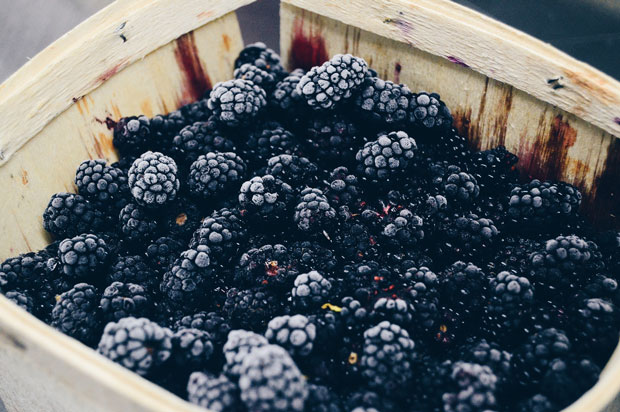Food & Diet
Can Dogs Have Blackberries? - The Powerful Benefits of Berries

Dogs are primarily carnivores, but that doesn’t mean they can’t benefit from small amounts of fruits and vegetables. Blackberries, for example, are loaded with vitamins, minerals, and antioxidants.
They are also high in sugar and should only be used as an occasional treat. After all, dogs don’t need fruits and vegetables in their diet. Their digestive tract is shorter than ours and is not able to digest fruits and vegetables fully.
Table of Contents
Before we compare the benefits of blackberries to other berries, it’s helpful to understand the benefits of certain vitamins and minerals to a dog’s overall health.
These vitamins ideally should come from your dog’s diet rather than supplements.
Benefits of Vitamins for Dogs
| Vitamin | Benefits |
|---|---|
| Vitamin A | Supports immune function and healthy skin and eyes. |
| Vitamin B6 | Generates glucose to regulate blood sugar and supports the nervous systems, immune system, and hormone functions. |
| Vitamin B12 | Supports the nervous system and cell growth. |
| Thiamine | Regulates energy and supports organ health, motor functions, eyesight, and carbohydrate breakdown. |
| Pantothenic acid | Supports metabolic function and energy creation. |
| Folate Acid | Supports cell function. |
| Niacin | Supports skin and coat; helps breakdown sugars and fats into energy. |
| Riboflavin | Supports energy production and regulates metabolism. |
| Vitamin C | An antioxidant that destroys free radicals, which harm healthy cells. |
| Vitamin D | Allows your dog to process minerals that aid bone growth and health. |
| Vitamin E | An antioxidant; helps support the immune system. |
| Vitamin K | Supports enzyme function and blood coagulation. |
Benefits of Minerals for Dogs
| Mineral | Benefits |
|---|---|
| Calcium | Supports healthy bones, teeth, and muscle function. |
| Copper | Helps the body absorb iron and prevents anemia. |
| Phosphorus | Supports the effectiveness of calcium. |
| Potassium | Supports healthy kidney, heart, and muscle function. |
| Zinc | Improves skin and coat. |
Can My Dog Have Blackberries?

Yes, your dog can have blackberries. Like all fruit, blackberries should be used as a treat conservatively and only occasionally. While they are super healthy for humans, they may upset your dog’s stomach, so watch for any gastrointestinal problems.
Blackberries have high levels of several vitamins, fiber, and antioxidants. They are rich in vitamin C, vitamin K, vitamin A, vitamin E, folate, niacin, B-6, and thiamine. They even supply a small amount of protein.
Blackberries also contain high levels of minerals. They are loaded with manganese, which dogs need, as well as potassium, copper, zinc, and calcium. Blackberries are also low in calories and contain no fat, but they are high in carbohydrates.
Surprisingly, blackberries are one of the fruits highest in omega-3 fatty acids.
How Do Other Berries Stack Up?
It’s always good to feed your dog a variety of different food to achieve optimal health. However, there are some berries that you should never give to your dogs.
Never give your dog cherries. Besides the fact that cherries have pits that are small enough to be a serious choking hazard, every part of the cherry, including the stem, the leaves, the tree, and the shrub, contains cyanide, which can be lethal if eaten in large enough quantities.
Never give your dog grapes (or currants and raisins). Grapes are highly toxic to dogs. They can cause sudden, acute kidney failure that can lead to death. Small dogs have been killed by eating as little as a single grape.
Check out our article What Fruits Dogs Can Eat: The Ultimate List to see which fruits are best.
Blackberries in small quantities can be beneficial to dogs. But are other berries better?
Blueberries

Blueberries are often called a “superfood” as they are rich in antioxidants, fiber, and vitamins. They are considered a healthy treat for dogs if given in moderation.
Blueberries are a little higher in calories than blackberries as they contain more sugar. Blueberries have slightly more carbohydrates and almost half the amount of fiber than blackberries.
Blueberries have less vitamin C, but are almost as high in vitamin K, and manganese as blackberries; they contain smaller amounts of vitamin E, vitamin B-6, pantothenic acid, vitamin A, thiamine, riboflavin, niacin and folate. They contain significantly less omega-3s than blackberries.
If your dog goes bananas for blueberries, they are a healthy addition in small amounts. Better yet, they can be stored in the freezer and given as a cold treat in hot weather.
Strawberries

Strawberries are another healthy option. The good news is that strawberries have less calories than blueberries and blackberries. So if your dog is a little on the chunky side, strawberries are the berry of choice.
Strawberries have less carbohydrates than blackberries, but blackberries have more fiber.
Strawberries have very little vitamin A, but they have more vitamin C. They have less calcium, iron, and omega-3s, and more vitamin B6, vitamin E, vitamin K, niacin, and thiamine. Strawberries and blackberries have similar amounts of folate acid.
Strawberries can also be frozen for a crunchy treat when the weather gets hot. And there’s a bonus: strawberries have an enzyme that can whiten your dog’s teeth. That should make both of you smile!
Raspberries

Raspberries have antioxidants that are beneficial to dogs, but they also contain low levels of natural xylitol, a substance that is toxic to dogs. If your dog is in love with the taste of raspberries, a moderate amount won’t be harmful.
Raspberries contain less calories and carbohydrates than blackberries. They contain slightly more fiber and omega-3s, and significantly more vitamin C; significantly less sugar, vitamin A and vitamin K; and slightly less vitamin B’s and vitamin E. Raspberries have a similar mineral content, but more iron and zinc.
You can treat your dog with raspberries as long as you don’t go overboard. Because of the xylitol content, stick to no more than 3 berries for small dogs and 6 berries for larger breeds.
Moderation is Key
All of these berries are healthy options for treats, but remember: dogs’ nutritional needs are very different from ours. These berries all have some nutritional benefits, but they should always be given in moderation, and only as long as your dog’s stomach can handle them. Too much of any fruit and vegetable can give your dog a very upset tummy.
Only a small portion of your dog’s diet, no more than 10%, should be comprised of fruits, vegetables, and treats. The rest should come from his regular dog food. But before you give your dog any food that they don’t naturally eat, be sure to do your research. Check out the list of dos and don’ts at the AKC or the ASPCA website.
Be careful which foods you give to your dog. Check out our list of toxic foods your dog should never have!
The Dog Diet Answer Book

The Dog Diet Answer Book will help you to better understand your fur baby’s dietary needs and help you to discover if addressing some of the health problems that he’s been having is as simple as changing the type of food that he’s eating, how many calories he’s consuming, or adding a bit more moisture to his fare.
- Topics:
- Food & Diet


